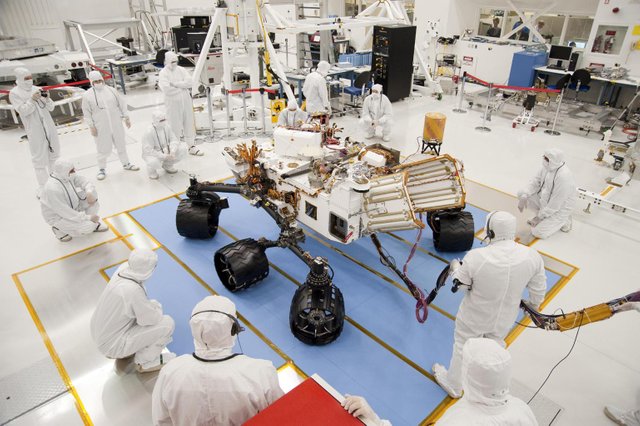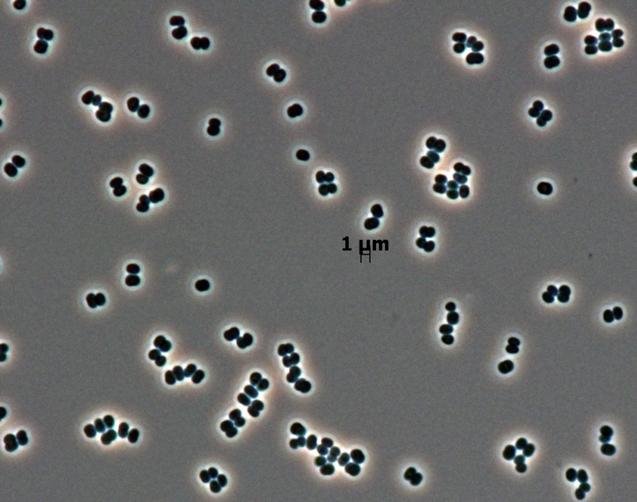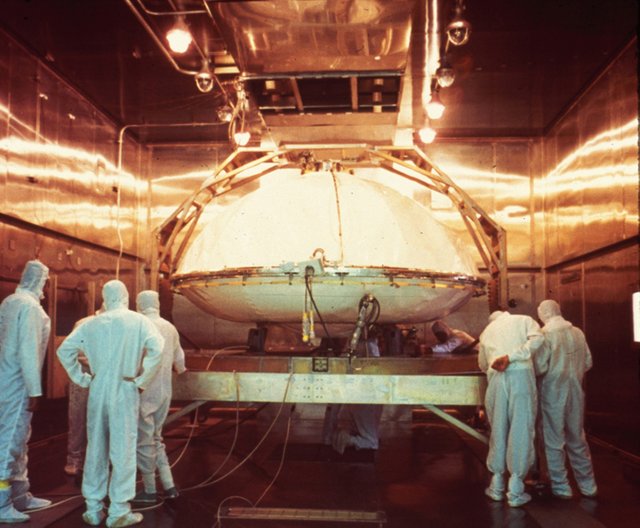Microbes? In my clean room? It's more likely than you think.
One of the articles making the rounds in the news recently is about the 'discovery' of microbes living in the clean rooms NASA uses to assemble spacecraft.

Executive Summary
- We have identified metabolically active bugs in NASA clean rooms
- Finding just bugs themselves is not newsworthy, but they survive by eating the alcohols and detergents used in cleaning
- Some bugs are really good in nutrient-poor conditions, but at a cost
- Finding out about them is one more small step towards planetary protection, which is a Good Idea.
Intro
First off, the existence of bugs in those places is, in itself, not news. We've known and have cataloged bugs in those places for a while. What is interesting is that we've recently figured out that some of them are not persisting in a dormant state, but are actively growing and we even know how some of them are doing it.
Even professional scientists reference Jurassic Park
When we find live bugs in an environment, that doesn't necessarily mean they're doing all that much. They could be in a semi-dormant state, just waiting for better times to roll along. It's not a surprise to find some dormant bugs in a clean room (which isn't the same as sterile - the standard for mars missions is to prevent exporting more than 300 spores/m2).
What is cool is that we now have confirmation that some of bugs detected are active in those rooms. Specifically, Dr. Mogul's team has figured out that when there's not much else to eat, Acinetobacter (which is notoriously hardy anyway) can switch to eating the traces of alcohols and even detergents used to clean the rooms. How badass is that?!
The tendency for bugs to grow in any environment if there's some way to make an energetic profit has been a recurring theme in my posts and it's no different here. The lead author even mentions that 'life will find a way' and directly acknowledges Malcom, et al. in Jur. Par. (1993).
Being a specialist comes at a cost
Although bugs are good at finding a way to live in low nutrient conditions (oligotrophs), living frugally comes at a cost, no matter how you achieve it. If you're Acinetobacter, the ability to switch from eating all the normal foods to low-yield stuff involves the burden of carrying all that extra genetic material to do so, sensing your environment, and giving true specialists a head start while you ramp up your alternate metabolic pathways.

Another strategy is more hardcore - some bugs decide that they won't simply tolerate low nutrient conditions, but specialize in them. The cost here is that although they'll thrive in in their niche, they will almost certainly be outcompeted by others in times of plenty. For example, there's one genera Tersicoccus that so far has only been found in clean rooms.
To be clear, that doesn't mean Tersicoccus evolved to live in clean rooms, specifically. Just that it's unlikely to be found in abundance relative to generalists in places that aren't so extreme. For example, there's another bug (Paenibacillus phoenicis) which is also pretty limited to clean-rooms, but has also been detected in boreholes a few kilometers underground.
All these worlds are yours except Europa. Attempt no landing there.
Why is this a concern? Unlike other clean rooms, such as integrated circuit factories or some surgical theaters, we're not as concerned with what's coming in as we are with what's going out.
As part of its mission of planetary protection (yes that's a thing, you can even apply to be an officer), NASA is trying to prevent accidentally contaminating other planets with microbes from Earth.

The main concern right now is making sure that if we detect life on other worlds, we know that it was indigenous and not a false signal from a hitchhiker. We can do this by comparing what we find to our growing catalog of clean room bugs.
That is a laudable goal, but I personally find myself also worrying about introducing invasive species. Think about how rats on ships can get onto an island and completely kill off the native fauna (at least, without massive intervention, they can).
Now, think about how, if we're honest, so much of our space research is at it's heart based on a yearning to find out we are not alone. Try to imagine how heart breaking it would be to find out that we weren't alone, until we introduced the equivalent of space rats to Europa, killing off all the native bugs under the ice with, I don't know, a particularly hardy form athlete's foot.
The idea of wiping out other, independent life is a what philosophers call a 'bummer', so here's an uplifting tidbit. Part of the regulations for planetary protection stem from the 1967 Outer Space Treaty. In reading about that, I found about about the term 'space law'. Yes, space law is a thing.

Bugs in the news? What's that?
Some of you may have noticed that my articles tend to be rather, well, long. I really enjoy doing deep dives on topics and relating them to broader themes, but that type of article isn't perfect for everything.
Specifically, it doesn't lend itself to timely, concise communications about microbial news. I often want to geek out about these, so partially as an excuse to do just that and partially as practice on more rapid, condensed (I'm aiming for 500-1000 words) writing, I've decided to give Bugs In the News a try.
Apart from the size goals, I'd like to use these to provide an insider's view on why the news items are (or aren't!) exciting and expand upon their implications in an engaging way. I'd also like to use at as an opportunity to back-translate when a science journalist gets an idea wrong or misses the point (not hating, it happens to all of us!). I'll be experimenting with the tone, frequency, and format and would really appreciate feedback.
I can also promise you two things:
- I won't ever just rehash press releases. I will endeavor to make reading my article worthwhile beyond the news article. Hopefully by expanding upon the relevant themes and synthesizing multiple views, but at least by making it more accessible and engaging.
- I very much enjoy my deep dives and won't be abandoning that format. Those of you with insomnia can rest assured there are more 2500+ word monsters in the pipe.
Great work. You do a damn good job of fleshing out a bit of news with some interesting discussion on bacteria. I've never thought of exporting invasive species to other plantets, but I'm sure bacteria could find a way to do it.
I myself have always hoped I was a short :)
Downvoting a post can decrease pending rewards and make it less visible. Common reasons:
Submit
Yikes! Well-spotted.
Downvoting a post can decrease pending rewards and make it less visible. Common reasons:
Submit
I can barely keep the cats' hair in my parents' home from getting everywhere, how is NASA going to keep microbes out?
It's only the pilot, but I feel Bugs In the News is already a great series!
Downvoting a post can decrease pending rewards and make it less visible. Common reasons:
Submit
Thanks for the feedback, it has been really encouraging to see the response.
Downvoting a post can decrease pending rewards and make it less visible. Common reasons:
Submit
Great discussion. I didn't know about the clean-room bacteria. We studied bacteria in the nutrient-poor environment of caves that were capable of using inorganic carbonate to synthesize organic carbon compounds.
Downvoting a post can decrease pending rewards and make it less visible. Common reasons:
Submit
Poor Mr. Monk, even the clean room isn't safe. 😉
Downvoting a post can decrease pending rewards and make it less visible. Common reasons:
Submit
Lol
Downvoting a post can decrease pending rewards and make it less visible. Common reasons:
Submit
Planetary protection? Even if this males totally sense, I was unaware of such a thing. I guess it is too late to discuss outer-space protection, unfortunately. By other space, I mean space itself and not the bodies inside it...
Downvoting a post can decrease pending rewards and make it less visible. Common reasons:
Submit
Especially the space in low earth orbit. it's becoming quite a problem.
Downvoting a post can decrease pending rewards and make it less visible. Common reasons:
Submit
This is exactly what I had in mind.
Downvoting a post can decrease pending rewards and make it less visible. Common reasons:
Submit
I really find this post interesting @effofex. I think the science community should be more proactive now with modifications that some organisms are experiencing in other for them to survive. Image those bugs eating alcohol and detergent? that really sounds crazy. We must be careful as you rightly put not to introduce some of these organisms to other planets (NASA ; warning). Invasive species could spell more doom than we could ever imagine!!!
Downvoting a post can decrease pending rewards and make it less visible. Common reasons:
Submit
Could you expand upon this?
Downvoting a post can decrease pending rewards and make it less visible. Common reasons:
Submit
Yeah, I was talking about the change in feeding habit of organisms. How do they cope with their nutrition requirement been modified to suit their new environment and yet survive. For instance how could those bugs survive on detergent and alcohol. Is it not weird?.
Downvoting a post can decrease pending rewards and make it less visible. Common reasons:
Submit
A good rule of thumb is that if there's a way to shuffle electrons on carbon, some bug somewhere is doing it. Unlike us, a lot of bugs have what we call 'phenotypic plasticity', which is a fancy way of saying that they can change around their metabolism (and other stuff) by activating alternate (usually) genetic pathways to adapt to their environment. It's like if we could start digesting grass, but only if we were starving in the first place.
Downvoting a post can decrease pending rewards and make it less visible. Common reasons:
Submit
Lol
Downvoting a post can decrease pending rewards and make it less visible. Common reasons:
Submit
Super cool stuff! (Love the 2010 reference especially.)
I'm actually working on a story based off the risks of biosphere cross-contamination between us and an alien ecosystem.
Downvoting a post can decrease pending rewards and make it less visible. Common reasons:
Submit
Looking forward to reading that one.
Given the subject matter, how could I not allude to 2010?
Downvoting a post can decrease pending rewards and make it less visible. Common reasons:
Submit
This is a blog to my heart man. I grew up working in a cleaner room in a chip producing company here near years and now I have been working in surgery for years.
Bacterias aint my friend ;)
But...they are growing through living of of alcohol you say? What would this mean if you would take them into space after a couple of years? Curious man!
Downvoting a post can decrease pending rewards and make it less visible. Common reasons:
Submit
Very cool that you worked in a clean room - would enjoy reading more about that!
What do you mean about taking them into space for a few years?
Downvoting a post can decrease pending rewards and make it less visible. Common reasons:
Submit
Well, from what I understand these bacterias are sort of super bugs right?
Im curious what will happen if you take them into space on a multi year journey how they would evolve.
Downvoting a post can decrease pending rewards and make it less visible. Common reasons:
Submit
Super bugs is kind of hard to define, but they certainly are hardy and adaptable.
If they were dormant, they probably wouldn't evolve much. My guess is that, if active, they'd retain and maybe enrich strategies to cope with low nutrients & moisture, and high radiioactive stress. Maybe heat/cold shock tolerance. Long enough, and they might lose the genetic pathways to take advantage of other foodstocks.
Downvoting a post can decrease pending rewards and make it less visible. Common reasons:
Submit
This topic is very interesting. Thanks for sharing.
Downvoting a post can decrease pending rewards and make it less visible. Common reasons:
Submit
I'm glad you liked it!
Downvoting a post can decrease pending rewards and make it less visible. Common reasons:
Submit
This is pretty much the idea on which Huxley's War of worlds is based
Downvoting a post can decrease pending rewards and make it less visible. Common reasons:
Submit
Are you referring to War of the Worlds?
Downvoting a post can decrease pending rewards and make it less visible. Common reasons:
Submit
yup yup. I forgot to add the end-star down there :P
Downvoting a post can decrease pending rewards and make it less visible. Common reasons:
Submit
Ah, I was wondering (yet hopeful for another book to add to the reading
listpile).
Downvoting a post can decrease pending rewards and make it less visible. Common reasons:
Submit
A smashing article, as usual. Totally accessible to the non-scientist and informative. However, I am really skeptical about space law. I mean, c'mon. Look at the G7. Look at NAFTA. Look at the Transpacific partnership. Or nuclear arms treaties. Will China, Russia or even Canada (!!) be bound by agreements that seem to cement US advantage? Look at the South China Sea, or Crimea.
I think contaminating space with our bugs is almost inevitable. Which is a scary thought, with consequences perhaps left to the imagination of our best science fiction writers. Truth is often present there before it becomes a reality.
Downvoting a post can decrease pending rewards and make it less visible. Common reasons:
Submit
Oh for sure, it's a bit more of an ideal than super binding. However, space is hard enough to get to that it's a bit more like Antarctica at this point, and the analogous treaties there have been somewhat stable.
Downvoting a post can decrease pending rewards and make it less visible. Common reasons:
Submit
I like the bugs in the news idea. The bugs are very newsworthy, always evolving into something new. Also, new developments will often touch on more than one area of science, so lots of opportunities for debate
Downvoting a post can decrease pending rewards and make it less visible. Common reasons:
Submit
Thanks for the encouragement, I was a bit hesitant, but the response has been really great.
Downvoting a post can decrease pending rewards and make it less visible. Common reasons:
Submit
Really awesome! Thanks for sharing
Downvoting a post can decrease pending rewards and make it less visible. Common reasons:
Submit
Glad you liked it!
Downvoting a post can decrease pending rewards and make it less visible. Common reasons:
Submit
Interesting stuff @effofex. On the other side of the bitcoin, perhaps we are being used as guinea pigs for aliens to test diseases and cures.
Downvoting a post can decrease pending rewards and make it less visible. Common reasons:
Submit
Hi @effofex!
Your post was upvoted by utopian.io in cooperation with steemstem - supporting knowledge, innovation and technological advancement on the Steem Blockchain.
Contribute to Open Source with utopian.io
Learn how to contribute on our website and join the new open source economy.
Want to chat? Join the Utopian Community on Discord https://discord.gg/h52nFrV
Downvoting a post can decrease pending rewards and make it less visible. Common reasons:
Submit
Thanks for this piece @effofex. I am not surprised that microbes were found in the clean room and for them to survive the unfavourable conditions then they must be pathogens.
Downvoting a post can decrease pending rewards and make it less visible. Common reasons:
Submit
I run into this from time to time. You would think that badass bugs were pathogens, but it turns out that most pathogens are wimpy. At least, in terms of their ability to tolerate uncomfortable conditions. They are so well-evolved to take advantage of our warm, wet, nutritious bodies that they tend to have a tough time living an alternate lifestyle. Some of them do go into a dormant state, so they're pretty hardy that way, but they aren't generally thriving.
Downvoting a post can decrease pending rewards and make it less visible. Common reasons:
Submit
I wonder what techniques the clean room workers will use to scrub the outgoing objects if the cleaning solution itself is what's feeding the organisms
Downvoting a post can decrease pending rewards and make it less visible. Common reasons:
Submit
There's not many alternatives, the big deal is not wrecking the equipment. You can heat treat, but that has its own issues. They might also flood it with ethylene oxide or gamma irradiate it, maybe.
Downvoting a post can decrease pending rewards and make it less visible. Common reasons:
Submit
Congratulations! This post has been chosen as one of the daily Whistle Stops for The STEEM Engine!
You can see your post's place along the track here: The Daily Whistle Stops, Issue #166 (6/15/18)
The STEEM Engine is an initiative dedicated to promoting meaningful engagement across Steemit. Find out more about us and join us today.
Downvoting a post can decrease pending rewards and make it less visible. Common reasons:
Submit
Awesome article! I can't imagine a rat sneaking aboard something that's going interplanetary, though I'm no space engineer!
From the medical perspective I know hospitals go to insane lengths to keep surfaces and patient's bug-free... but nothing every works :P
Downvoting a post can decrease pending rewards and make it less visible. Common reasons:
Submit
Nope, and that why there are so many nosocomial infections.
Downvoting a post can decrease pending rewards and make it less visible. Common reasons:
Submit